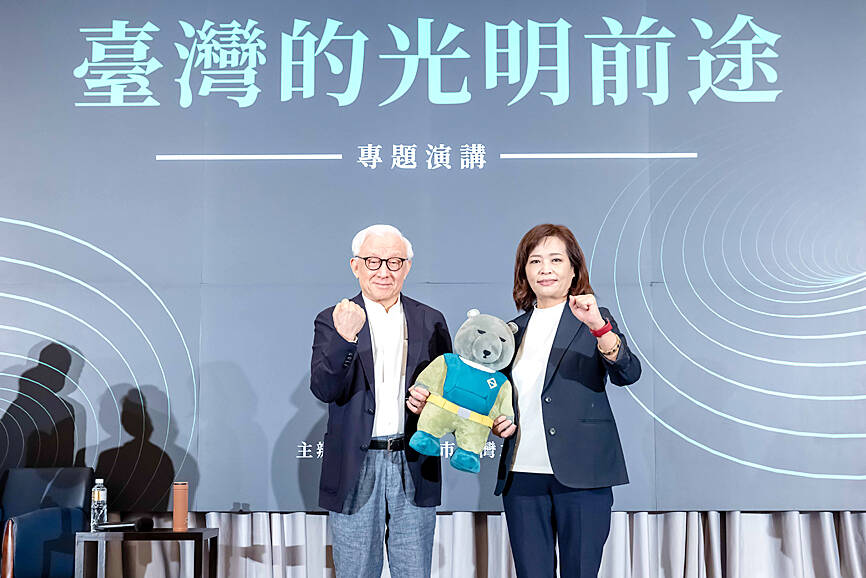Taiwan must remain independent and democratic, Robert Tsao (曹興誠), founder and former chairman of contract chipmaker United Microelectronics Corp (UMC), told an event in Hsinchu City yesterday.
In a speech titled “Taiwan’s bright future,” he said that people might feel depressed amid China’s pressure campaign against Taiwan, Russia’s invasion of Ukraine, inflation and the current soft stock market.
However, the future of the world is bright, he said.

Photo: Tsai Chang-sheng, Taipei Times
The economies of many countries are growing exponentially, there is increasingly less poverty and life expectancy is rising in many countries, while the infant mortality rate is improving, he said, citing data from popular science author Steven Pinker‘s book Enlightenment Now.
Taiwan “must maintain its independence and follow the spirit of Enlightenment Now,” he said.
Protests over an extradition bill in Hong Kong made him realize that “China is a gangster,” he said, adding that everyone should unite to defend Taiwan against China.
A survey conducted by the Guardian showed that half of the respondents believed that other countries should help Taiwan if China attempts to annex it by force, which indicated that China has stirred up hatred against itself across the globe, he said.
“Supporting Taiwan’s independence is befriending the world, while supporting Taiwan’s unification [with China] is making an enemy of the world,” he said.
There are five important values of enlightenment: humanitarianism, rationality and science, technology and industry, wealth created by the division of labor based on expertise, and global trade growth driven by the mechanism of the market, he said.
“Democracy protects human rights,” he said.
While some entrepreneurs believe that “we cannot live on democracy alone,” Tsao said he believes that “life without democracy is difficult to live.”
He implemented the concept of division of labor in the foundry business in 1984, dividing the production of chips into designing, manufacturing and packaging, which contributed to Taiwan’s success in the semiconductor industry, he said.

Taiwan has received more than US$70 million in royalties as of the end of last year from developing the F-16V jet as countries worldwide purchase or upgrade to this popular model, government and military officials said on Saturday. Taiwan funded the development of the F-16V jet and ended up the sole investor as other countries withdrew from the program. Now the F-16V is increasingly popular and countries must pay Taiwan a percentage in royalties when they purchase new F-16V aircraft or upgrade older F-16 models. The next five years are expected to be the peak for these royalties, with Taiwan potentially earning

STAY IN YOUR LANE: As the US and Israel attack Iran, the ministry has warned China not to overstep by including Taiwanese citizens in its evacuation orders The Ministry of Foreign Affairs (MOFA) yesterday rebuked a statement by China’s embassy in Israel that it would evacuate Taiwanese holders of Chinese travel documents from Israel amid the latter’s escalating conflict with Iran. Tensions have risen across the Middle East in the wake of US and Israeli airstrikes on Iran beginning Saturday. China subsequently issued an evacuation notice for its citizens. In a news release, the Chinese embassy in Israel said holders of “Taiwan compatriot permits (台胞證)” issued to Taiwanese nationals by Chinese authorities for travel to China — could register for evacuation to Egypt. In Taipei, the ministry yesterday said Taiwan

‘LIKE-MINDED PARTNER’: Tako van Popta said it would be inappropriate to delay signing the deal with Taiwan because of China, adding he would promote the issue Canadian senators have stressed Taiwan’s importance for international trade and expressed enthusiasm for ensuring the Taiwan-Canada trade cooperation framework agreement is implemented this year. Representative to Canada Harry Tseng (曾厚仁) in an interview with the Central News Agency (CNA) said he was increasingly uneasy about Ottawa’s delays in signing the agreement, especially as Ottawa has warmed toward Beijing. There are “no negotiations left. Not only [is it] initialed, we have three versions of the text ready: English, French and Mandarin,” Tseng said. “That tells you how close we are to the final signature.” Tseng said that he hoped Canadian Prime Minister Mark Carney

POSITIVE DEVELOPMENT: Japan and the US are expected to hold in-depth discussions on Taiwan-related issues during the meeting next month, Japanese sources said The holding of a Japan-US leaders’ meeting ahead of US President Donald Trump’s visit to China is positive news for Taiwan, former Japan-Taiwan Exchange Association representative Hiroyasu Izumi said yesterday. After the Liberal Democratic Party’s landslide victory in Japan’s House of Representatives election, Japanese Prime Minister Sanae Takaichi is scheduled to visit the US next month, where she is to meet with Trump ahead of the US president’s planned visit to China from March 31 to April 2 for a meeting with Chinese President Xi Jinping (習近平). Japan and the US are expected to hold in-depth discussions on Taiwan-related issues during the